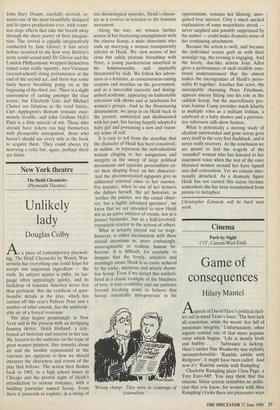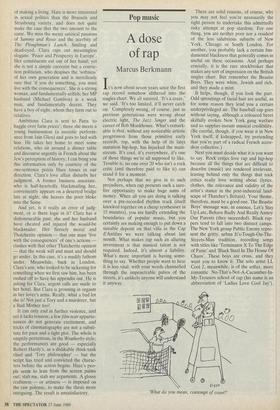Cinema
Paris by Night ('15', Curzon West End)
Game of consequences
Hilary Mantel
Aspects of David Hare's political thril- ler call to mind Yeats's lines: 'The best lack all conviction, while the worst/ Are full of passionate integrity.' Unfortunately, other aspects remind one of that more popular verse which begins, 'Life is mostly froth and bubble . . . .' Substance is lacking. Hare's earlier film Weatherby was stylishly incomprehensible: 'Ramble awhile with Redgrave', it might have been called. And now it's 'Ramble awhile with Rampling'.
Charlotte Rampling plays Clara Page, a Tory Euro-MP. You may think that this sinuous, feline actress resembles no politi- cian that you know; for women with Miss Rampling's looks there are pleasanter ways of making a living. Hare is more interested in sexual politics than the Brussels and Strasbourg variety, and does not quite make the case that the two amount to the same. We miss the messy satirical passions of Sammy and Rosie and the acerbity of The Ploughman's Lunch. Smiling and dead-eyed, Clara raps out meaningless slogans: 'Peace and Prosperity in Europe'. Her constituents eat out of her hand; yet she is not a simple careerist but a convic- tion politician, who despises the 'softness' of her own generation and is mercilessly sure that 'if you do something, you must live with the consequences'. She is a strong woman, and fundamentally selfish; her MP husband (Michael Gambon) is a weak man, and fundamentally decent. They have a boy of eight, whom they farm out to relatives.
Ambitious Clara is sent to Paris `to haggle over farm prices'; there she meets a young businessman (a narcotic perform- ance from lain Glen) and goes to bed with him. He takes her home to meet some relations, who sit around a dinner table and discourse urgently in French about the Jew's perception of history; I can bring you this information only by courtesy of the one-sentence précis Hare tosses in our direction. Clara's love affair disturbs her judgment. A former business associate. who is half-heartedly blackmailing her, conveniently appears on a deserted bridge late at night; she heaves the poor bloke into the Seine.
And yet, is it really an error of judg- ment, or is there logic in it? Clara has a dishonourable past: she and her husband have cheated and injured the would-be blackmailer. Her fiercely moral and Thatcherite opinion — that one must 'live with the consequences' of one's actions clashes with that other Thatcherite opinion — that the weak will and must and should go under. In this case, it's a muddy fathom under. Meanwhile, back in London, Clara's son, who looked to be sickening for something when we first saw him, has been rushed off to have his appendix out. He is asking for Clara; urgent calls are made to her hotel. But Clara is groaning in orgasm in her lover's arms. Really, what a bad lot she is! Not just a Tory and a murderer, but a Bad Mother too!
It can only end in further violence, and yet it lacks tension; a few film noir appurte- nances do not generate excitement, and tricks of cinematography are not a substi- tute for pace and a tight plot. The whole is emptily portentous, in the Weatherby style; the performances are good — especially Robert Hardy's, as a dislikable think-tank chief and 'Tory philosopher' — but the script has tried and convicted the charac- ters before the action begins. Hare's peo- ple seem to lean from the screen palms out: stab me, stab my arguments. A glossy craftiness — or artiness — is imposed on the raw polemic, to make the thesis more intriguing. The result is unsatisfactory.



















































 Previous page
Previous page